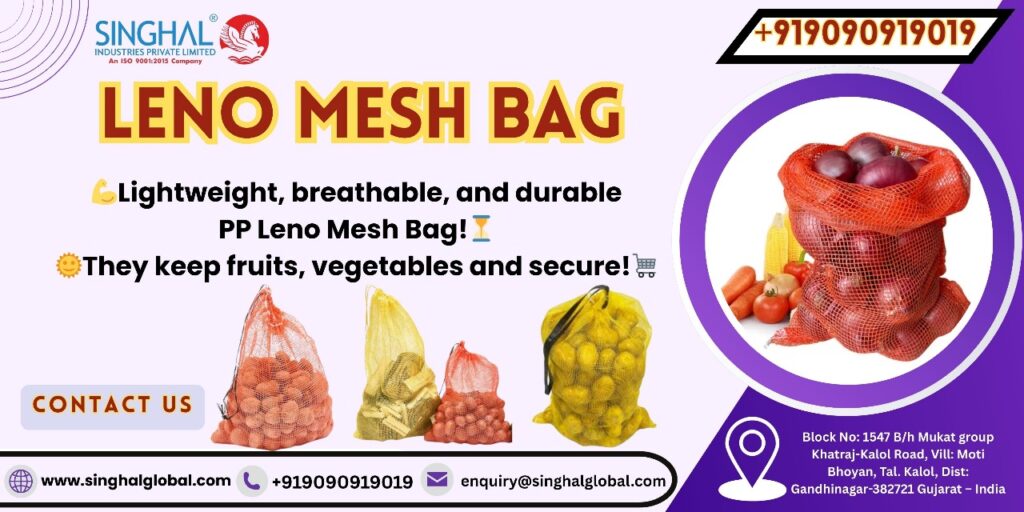When I went to visit my uncle’s onion farm of onions last season, I was amazed by something simple and yet so revolutionary – these vibrant blue mesh bags which let me smell, see, and even be able to taste fresh onions in them. It was then that I understood the reason Leno mesh bags are an industry-changing tool in agriculture. These aren’t your typical bags; they’re the unspoken heroes of the entire farm-to-market process.
The Journey Begins at the Farm
Imagine this: It’s harvest time, and the farmers race against the clock to bring their harvest from the field to the market while maintaining high quality. The traditional packaging techniques? Let’s say that they frequently resulted in farmers being frustrated by poor quality products and unsatisfied customers.
The leno bags have been created with a unique leno weave technique which creates unstructured mesh. This isn’t just fancy talk; it’s what keeps the veggies fresh.
I remember having a conversation with Rajesh, who is a potato farmer from Punjab. I spoke to him, and he said, “Before using these mesh bags, I was losing nearly 15% of my crop to spoilage during transport. Now? Maybe 3-4% on a bad day.” This is real money saved and real families being satisfied.
Understanding Leno Bags Price Dynamics
Let’s get numbers since every farmer would like to know: What’s the Leno bags price? Based on current market prices it’s anywhere between Rs5 and Rs200 per bag, based on the quality and size. However, here’s where it gets fascinating – if you reduce it into leno bags’ price per kilogram, the prices get even more attractive:
- Dimensions and capacities: The smallest bags of 5kg cost about Rs5-8 each for larger 50kg bags, while the price could cost as much as Rs200.
- High-quality polypropylene bags fetch higher prices
- Customization: Branded or printed bags are more expensive than plain bags
- Bulk orders usually get lower rates per kilo
It’s interesting to see how the price of leno bags per kilogram works in favor of farmers. When you consider the reduction in spoilage, lower costs for transportation due to the light construction and reuse, the total cost is surprisingly affordable.
The Science Behind the Mesh
This is where things get more technical but remain with me as this is vital. First, they offer optimal airflow – vital for crops like potatoes and onions, which remain to “breathe” even after harvest. The mesh also permits visual inspection by opening up the bag which is an enormous time-saver in quality inspections.
This means no more “pig in a poke” situations where you aren’t aware of the quality of what you’re getting until you take the bag open. Transparency builds trust between buyers and farmers and is a huge benefit in the agricultural market.
Market Dynamics and Pricing Trends
The market for agricultural packaging has seen exciting developments in the pricing of leno bags. Although individual bags may appear costly, the analysis per kilogram provides a different picture. Take this example that a bag weighing 25kg that costs Rs50 will cost the equivalent of Rs2 per kg of packing capacity.
Furthermore, the reusability aspect alters the game completely. A good leno bag is able to be used for 5-10 times before exhibiting significant wear, which can reduce the price per use by a significant amount.
Environmental Impact and Sustainability
Made of polypropylene they’re recyclable and reusable. As opposed to plastic bags that are only used once, farmers can utilize the same bag for many harvest cycles.
I’ve observed the farmers of Karnataka making use of the exact leno bags over three consecutive seasons. They do get somewhat worn-out however they accomplish their tasks flawlessly. Reusability is a crucial factor in the current climate-conscious market where sustainable practices aren’t only a good practice, it’s also good business.
Transportation Benefits
The trip from farms to markets is when leno mesh bag shine. Their light weight construction means that the ability to load more products on a truck, thus reducing transport cost per pound. The mesh design allows air circulation throughout the transport process which is essential to ensure high quality across long distances.
The trucks that arrived with products in bags made of leno had noticeable fresher looking onions than the ones that were packaged in traditional containers. The differences were striking and so was the price they were able to charge.
Quality Considerations and Manufacturing Standards
All leno bags are not made to be the same. The quality of the polypropylene used as well as the tightness of the weave, as well as the strength of the stitching have an impact on. The top manufacturers adhere to the strictest quality standards, making sure their bags are strong enough to withstand harsh conditions of farming.
When selecting vendors, producers should search for companies that offer high-quality products, customizable options and dependable supply chains. The best manufacturers typically provide product liability insurance and also maintain ISO certifications.
Economic Impact on Small Farmers
Small-scale farms, economics of mesh bags made from leno could be transformative. The reduction in spoilage can make the difference between the loss and profit in a highly competitive market. In addition, the professional look of food products in high-quality packaging is often a sign of premium quality.
Cooperative societies are more often bulk-purchasing leno bags to secure more favorable costs for its members. The collective purchasing power can help small farmers get access to quality packaging at a reasonable price.
Conclusion: The Future is Meshed
From the reduction of food waste to increasing the income of farmers, these simple baggies are slowly changing the way we farm.
The price dynamics, although initially appearing complicated, actually work in favour of the farmers when you take into account how much it costs to own the equipment. A combination of strength, reusability and benefits for performance make the Leno bags price per kg very reasonable in the grand scheme of things.
Frequently Asked Questions (FAQ)
Q1. Is it possible to wash Leno mesh bags machine washable?
Yes, The bags can be washed using water and soap which makes them suitable for multiple purposes. Soaking them in water with soap and gently stirring will ensure thorough cleaning but care should be taken to steer clear of any harsh scratching that could harm the mesh.
Q2. Do I have to make use of Leno mesh bags to store potatoes or onions?
Absolutely! Many farmers report dramatically improved storage results after switching on to the leno bags that are used for these crop varieties.
Q3. Will Leno mesh bags be allowed to carry food products?
They’re great for transport. The light and durable design allows them to be ideal for transport and the mesh construction permits continuous air circulation during transportation. This ensures the quality of produce across long distances, and decreases the rate of spoilage significantly.
Q4. Do Leno mesh bags appropriate for export?
Definitely! The Leno mesh bag is extensively employed for exports. They are lightweight, which makes it easier to transport, and their strength ensures that they arrive in good order. Many buyers from abroad specifically want products packed in bags made of leno because of their preservation qualities.
Q5. Who is the largest manufacture of Leno Mesh Bags?
While China is the world’s largest producer, with the largest hubs located within Shandong, Hebei, and Zhejiang provinces, India has several significant manufacturing companies, such as Singhal Industries and Shalimar Group.









